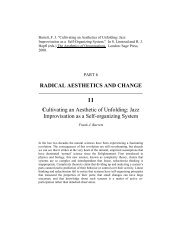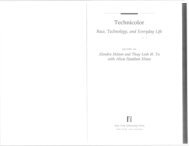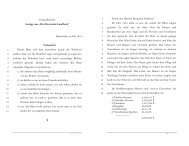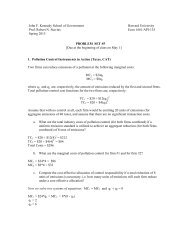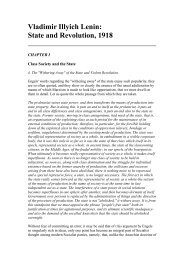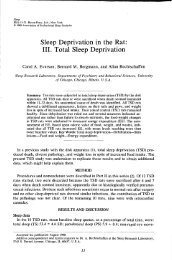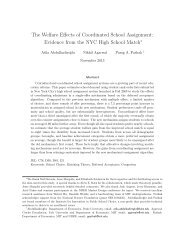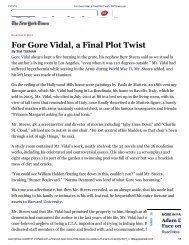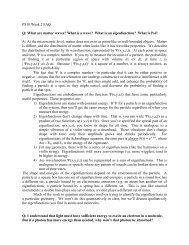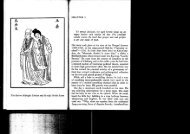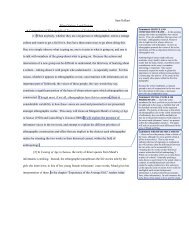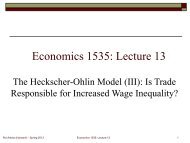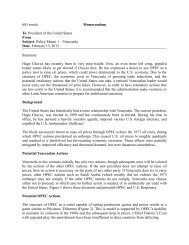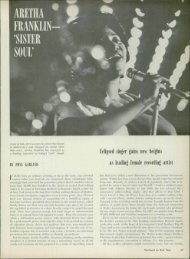A Guide to the ALM Thesis - iSites - Harvard University
A Guide to the ALM Thesis - iSites - Harvard University
A Guide to the ALM Thesis - iSites - Harvard University
You also want an ePaper? Increase the reach of your titles
YUMPU automatically turns print PDFs into web optimized ePapers that Google loves.
Chapter 3: The Research Proposal | 45<br />
A final reason for rejection is that <strong>the</strong> proposal lacks <strong>the</strong> proper format or consistently demonstrates substandard<br />
usage of English. Be sure that all <strong>the</strong> sections required by <strong>the</strong> <strong>Guide</strong> have been included in <strong>the</strong><br />
proposal and that your spelling, grammar, usage, and typing are accurate. Since <strong>the</strong> <strong>ALM</strong> is both a graduate<br />
degree and <strong>the</strong> highest academic degree awarded in Extension, standards for English usage are correspondingly<br />
strict. Non-native English speakers may need <strong>to</strong> allot extra time for <strong>the</strong> preparation of <strong>the</strong> research proposal in<br />
order <strong>to</strong> ensure that <strong>the</strong>ir language use meets <strong>ALM</strong> standards.<br />
The writing style in all instances must follow <strong>the</strong> guidelines established in standard writing handbooks and must<br />
be at <strong>the</strong> same level expected in <strong>the</strong> final <strong>the</strong>sis. Acceptance of <strong>the</strong> proposal will depend at least in part on <strong>the</strong><br />
adequacy of <strong>the</strong> presentation. Correct grammar, spelling, format, citations, and a meticulously proofread text are<br />
essential. The pages of <strong>the</strong> proposal must be numbered.<br />
Some students assume that because <strong>the</strong> research proposal is only a first step in <strong>the</strong> <strong>the</strong>sis process, form does not<br />
count. This assumption is a mistake. It is <strong>the</strong> overall presentation of <strong>the</strong> proposal—i.e., its content and its form—<br />
that will determine whe<strong>the</strong>r a professor will consent <strong>to</strong> become your <strong>the</strong>sis direc<strong>to</strong>r.<br />
As a rule, use <strong>the</strong> first-person singular (“I”) sparingly in <strong>the</strong> proposal and in <strong>the</strong> final <strong>the</strong>sis. Paren<strong>the</strong>ses and<br />
successive one-sentence paragraphs should also be used only with discretion. Examine lengthy paragraphs<br />
carefully for coherence and economy, making sure that each paragraph conveys a separate, unambiguous point.<br />
Avoid using <strong>the</strong> passive voice, which leads <strong>to</strong> dull and soporific writing (e.g., “it has been argued,” “<strong>the</strong>se points<br />
were mentioned,” “<strong>the</strong> paintings were viewed”).<br />
Unless <strong>the</strong> author of a particular work is a highly significant figure, references <strong>to</strong> that work should emphasize <strong>the</strong><br />
<strong>to</strong>pic of inquiry, not <strong>the</strong> author’s name or <strong>the</strong> title of <strong>the</strong> work. Do not simply refer <strong>to</strong> <strong>the</strong> “Smith <strong>the</strong>sis”; tell us<br />
what Smith’s <strong>the</strong>sis is. In o<strong>the</strong>r words, do not indulge in scholarly name-dropping. Demonstrate that you have<br />
read and unders<strong>to</strong>od <strong>the</strong> work in question by referring <strong>to</strong> its substance ra<strong>the</strong>r than its form.<br />
Also, in a scholarly <strong>the</strong>sis based upon careful research, certain types of expressions should be avoided, like<br />
“<strong>the</strong> ineffectual Carter administration” or “<strong>the</strong> US foreign policy debacles.” They are emotionally <strong>to</strong>ned; <strong>the</strong><br />
<strong>the</strong>sis becomes a polemic or a diatribe, and <strong>the</strong> research <strong>the</strong>reby becomes less convincing. Persuasion should<br />
be achieved with evidence and a careful, reasoned interpretation, not through force of rhe<strong>to</strong>ric or <strong>the</strong> use of<br />
exclamation points. Polemical language belongs on <strong>the</strong> op-ed page of a newspaper or in <strong>the</strong> halls of Congress,<br />
but not in <strong>the</strong> <strong>ALM</strong> <strong>the</strong>sis. Its presence <strong>the</strong>re can only detract from <strong>the</strong> seriousness of your presentation and<br />
prejudice <strong>the</strong> reader against your point of view.<br />
Some of <strong>the</strong> most common mistakes in grammar, punctuation, and usage made by <strong>ALM</strong> students are listed<br />
in Appendix 4. Additional help is available through <strong>the</strong> Writing Center in <strong>the</strong> Extension School. Students are<br />
advised as well <strong>to</strong> consult <strong>the</strong> bibliography in Appendix 5.<br />
<strong>Guide</strong>lines for Bibliography and Notes<br />
As stated above, <strong>the</strong>re are three different and distinct methods for notes and bibliography that may be used<br />
in <strong>the</strong> <strong>ALM</strong> <strong>the</strong>sis, depending on <strong>the</strong> candidate’s field. All candidates must use one or <strong>the</strong> o<strong>the</strong>r in writing<br />
both <strong>the</strong> research proposal and <strong>the</strong> final <strong>the</strong>sis. (The only exception <strong>to</strong> this rule is a case in which <strong>the</strong> student<br />
and <strong>the</strong>sis direc<strong>to</strong>r, in consultation with <strong>the</strong> research advisor, decide <strong>to</strong> prepare <strong>the</strong> <strong>the</strong>sis for publication<br />
in a journal that uses a particular notational style.) For <strong>the</strong> sake of convenience we will refer <strong>to</strong> <strong>the</strong>m as <strong>the</strong><br />
American Psychological Association (APA) method, <strong>the</strong> Modern Language Association (MLA) method, and <strong>the</strong><br />
Chicago Manual of Style (CMS) method. Those degree candidates writing <strong>the</strong>ses in biology, anthropology and<br />
archaeology, or psychology should use <strong>the</strong> APA method; those writing a <strong>the</strong>sis in all fields of <strong>the</strong> humanities<br />
should use <strong>the</strong> MLA method. Those in <strong>the</strong> social sciences fields of government, his<strong>to</strong>ry, international relations,<br />
A <strong>Guide</strong> <strong>to</strong> <strong>the</strong> <strong>ALM</strong> <strong>Thesis</strong>



